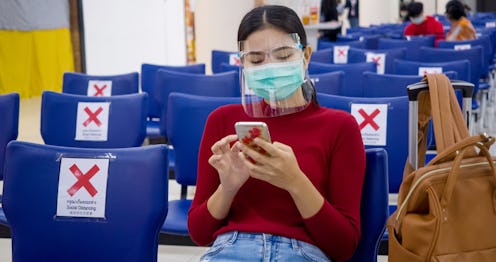Wellness
How Face Shields Compare To Cloth Masks In Protecting Against COVID

Your favorite superhero-pattern face mask might need an upgrade. While cloth face masks have become widespread to prevent the spread of coronavirus, some medical experts say the use of face shields, clear Plexiglass or plastic windows worn on a headband to cover the face, might be more effective.
Face masks are largely used to keep you from passing coronavirus to those around you. "If you are sick, wearing a basic surgical mask or facial covering prevents you (although not 100%) from giving the virus to others," Dr. Larry Burchett M.D., an emergency physician, tells Bustle. "If you wanted to be sure you didn't spew a single viral particle out into the world, you'd put on a full vapor respirator (essentially a gas mask)." Vapor respirators and N95 masks, which are generally reserved for medical personnel, are more effective than simple cloth at stopping the spread and contagion of viral illnesses.
But nobody is recommending that people wear vapor respirators every day. For one thing, you'd look terrifying at the supermarket; for another, they should be reserved for healthcare workers. This is where face shields come in: they might be more effective than cloth masks, allow you to communicate with others, and are more available than specialized gear.
An editorial published in JAMA in 2020 noted that face shields may have a series of advantages over cloth masks when it comes to containing COVID-19. "They are infinitely reusable and easy to clean," Dr. Teresa Bartlett M.D., senior medical officer at claims management service Sedgwick, tells Bustle. "Additionally, they are more comfortable to wear when you consider all the people that find a face mask confining, uncomfortable, and hot." They don't need to be thrown away after multiple uses, or taken off to communicate or eat. And they stop you from touching your face.
"A facial shield also protects your eyes, offering some additional protection over a mask," Dr. Burchett says, which could be more important than you think. A study published in Graefe's archive for clinical and experimental ophthalmology in 2020 suggests that ocular transmission, or being exposed to the coronavirus through the surface of your eyes, could be a key part to how COVID-19 spreads.
The JAMA editorial pointed to several studies of face shields and influenza, a virus roughly the same size as coronavirus, showing that shields up to 96% effective at reducing viral exposure compared to no mask at all. Nobody has yet tested how face shields might protect others from asymptomatic people with coronavirus. While the exact efficacy rate of cloth masks isn't known, it's estimated that if 95% of the population wore them, 33,000 deaths could be avoided, among other very compelling data points.
Face shields can also help people who can't wear cloth masks for one reason or another. "There are certain members of society with asthma or chronic lung conditions that have difficulty wearing masks, which can be as much an emotional issue as a medical concern," Dr. Bartlett says. "These groups are often the most vulnerable and the ones who need to wear personal protective equipment the most. A face shield can be an answer that provides comfort and protection to them and others.”
Not everybody is convinced, though. A 2016 review noted that face shields have disadvantages too; they're bulky, hard to fit, and inclined to fog up and make it hard to see. Face shields are in high demand by hospitals, as they're meant to be paired with face masks for people working in coronavirus wards. There's currently no guidance on reserving them for healthcare workers, but it's good to keep abreast of developments, as PPE availability can fluctuate. 3D printing technology and mass production allow face shields to be produced cheaply — there are a wide range available for less than $25 each, though cloth masks will remain less expensive.
Your cloth mask is probably doing just fine to protect you from the coronavirus if you wear it properly and wash it often. If you do get a shield, though, it can't hurt to use it.
Experts:
Dr. Larry Burchett M.D.
Dr. Teresa Bartlett M.D.
Studies cited:
Perencevich, E.N., Diekema, D.J., Edmond, M.B. (2020) Moving Personal Protective Equipment Into the Community: Face Shields and Containment of COVID-19. JAMA. 323(22):2252–2253. doi:10.1001/jama.2020.7477
Qing, H., Yang, Z., Shi, M., & Zhang, Z. (2020). New evidence of SARS-CoV-2 transmission through the ocular surface. Graefe's archive for clinical and experimental ophthalmology 1–2. Advance online publication.
Roberge R. J. (2016). Face shields for infection control: A review. Journal of occupational and environmental hygiene, 13(4), 235–242. https://doi.org/10.1080/15459624.2015.1095302